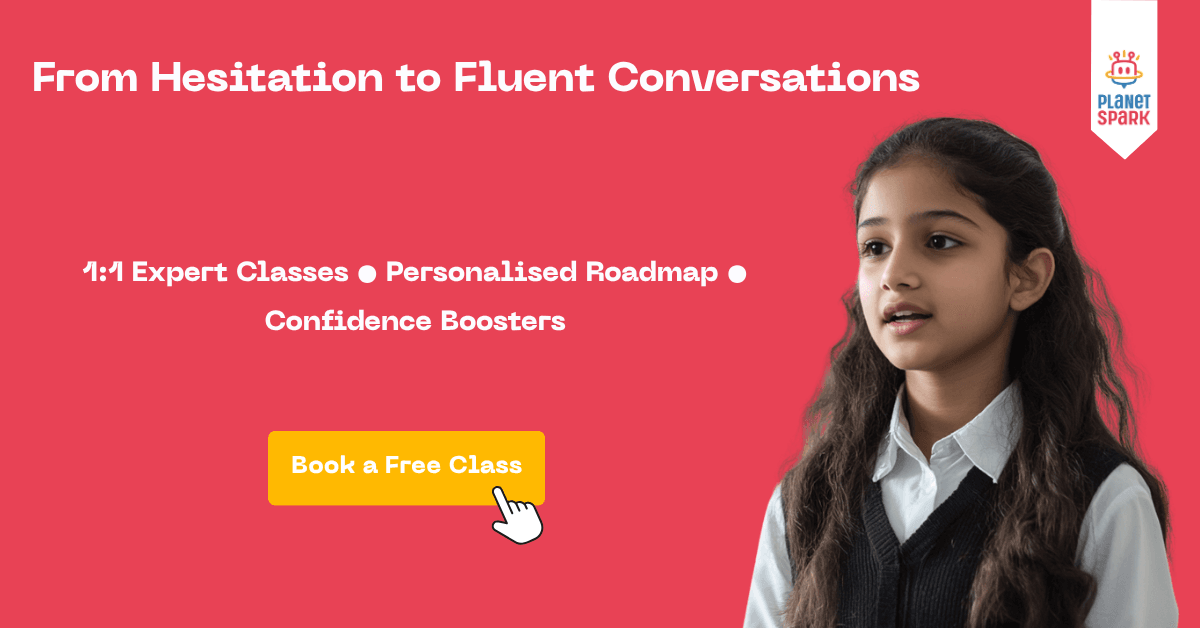English Learning for Beginners: Step-by-Step Guide

Table of Contents
- Who is Considered a Beginner in English?
- What Should Beginners Learn First? A Step-by-Step Guide
- Common Challenges Faced by Beginners
- Top Resources for English Learning for Beginners
- Why Live Interaction Is Better Than Recorded Video Lessons
- Why PlanetSpark Is the Best Platform for English Learning fo
- PlanetSpark’s Spoken English Program: Features That Make a D
- Conclusion: Give Your Child the Best Start in English
English learning for beginners doesn’t have to be overwhelming. If your child is just starting school or facing challenges with basic communication, English can be fun, interactive, and effective with the right approach. Today, English is more than just a subject, it's the gateway to academic excellence, global exposure, and self-confidence.
This guide is tailored for parents who want to support learning English for beginners, with a focus on simple strategies, tools, and resources including how PlanetSpark’s Spoken English course makes it easier than ever.
Who is Considered a Beginner in English?
A beginner isn’t necessarily someone who doesn’t know any English. It can also include:
- A young child starting school with no English exposure at home
- A student familiar with the alphabet but struggling with reading or speaking
- A learner who can read but can’t clearly express ideas
- Children who need help with vocabulary, grammar, or pronunciation
Each beginner has a unique starting point. Identifying learning gaps is key to planning the right approach.

What Should Beginners Learn First? A Step-by-Step Guide
Learning English as a beginner should follow a simple and logical sequence to ensure smooth progress. Here’s a clear, step-by-step learning path:
Step 1: Learn Phonics and Alphabet Sounds
Begin with phonics, the relationship between letters and sounds. It helps children decode new words and strengthens reading skills. Tools like flashcards, phonics apps, and sound games are perfect starters.
Step 2: Build Everyday Vocabulary
Introduce commonly used words like names of objects, actions, and emotions. Focus on categories such as food, colors, school items, and body parts. Reinforce through repetition, visuals, and usage in daily conversation.
Step 3: Form Simple Sentences
Once vocabulary improves, teach how to construct basic sentences like “This is a pen” or “I am eating.” Start with present tense and gradually include past and future forms.
Step 4: Practice Listening and Speaking
Engage children in everyday conversations using short questions and answers: “How are you?”, “What is this?” Use storytelling, rhymes, and pretend play to encourage speaking.
Step 5: Understand Basic Grammar
Introduce simple grammar concepts in context. Start with:
- Articles: a, an, the
- Pronouns: he, she, it
- Prepositions: in, on, under Keep it conversational and activity-based.
Step 6: Begin Simple Reading
Use phonics readers, picture books, and beginner-level stories. Encourage reading aloud and follow-up discussions. Focus on word recognition and sentence understanding.
Step 7: Encourage Writing Small Sentences
Have children write about their day, label pictures, or complete sentence prompts. Writing helps reinforce grammar, vocabulary, and sentence structure.
By following these steps, children gradually build strong communication skills and language confidence.
Common Challenges Faced by Beginners
English can be intimidating at first. Here are typical hurdles and how to overcome them:
- Fear of Making Mistakes: Kids hesitate to speak due to fear of errors
- Mother Tongue Influence: Pronunciation often carries native language influence
- Irregular Practice: Without regular exposure, children struggle to retain concepts
- Monotonous Learning: Rote learning without context reduces interest
The solution? Make English engaging, interactive, and practical just like PlanetSpark does.
Top Resources for English Learning for Beginners
Whether your child is just starting their English journey or needs a confidence boost, the right tools can make all the difference. Here are some of the best resources for English learning for beginners that make learning fun, effective, and engaging:
1. English Learning Apps for Beginners
Apps are a great way to reinforce learning through interactive games, visuals, and quizzes. Recommended apps include:
PlanetSpark App – Offers AI-backed speaking tools, vocabulary games, phonics, and grammar-based learning.
Duolingo – Uses gamification to teach basic vocabulary and sentence formation in English.
BBC Learning English Kids – Great for learning English through videos, stories, and pronunciation lessons.
These apps help kids stay consistent and motivated with daily practice.
2. English Learning Books for Beginners
Books introduce vocabulary and sentence structures in a natural and enjoyable way. Some great beginner-level book series include:
Ladybird Read It Yourself – A graded reading program with colorful illustrations and simple text for kids.
Oxford Phonics World – Helps children master phonics and sound recognition while having fun.
Scholastic Early Readers – Offers engaging stories with repetitive sentence patterns to reinforce vocabulary.
Start with picture books, then gradually move to beginner storybooks as confidence builds.
3. YouTube Channels for Learning English for Beginners
Video content provides audio-visual cues that aid comprehension and pronunciation. Some top YouTube channels include:
KidsCamp – Features animated rhymes, vocabulary songs, and basic English tutorials.
English Singsing – Offers beginner English conversations, phonics songs, and grammar lessons.
Storyberries – Narrates children's stories in simple English, promoting listening and reading skills.
Always supervise viewing time and choose age-appropriate playlists.
4. Printable Worksheets and Offline Activities
Printable worksheets help children practice grammar, vocabulary, and writing skills at home. Look for resources that include:
Sentence construction activities
Vocabulary match games
Grammar quizzes and fill-in-the-blanks
Picture labeling and writing prompts
These worksheets are ideal for reinforcing classroom learning with hands-on tasks.
5. Live Online English Classes for Beginners
Nothing beats real-time learning when it comes to spoken English. Platforms like PlanetSpark stand out because they offer:
Live 1:1 sessions with certified communication trainers\n- Phonics, grammar, and conversation integrated in every class, Instant feedback on pronunciation, sentence fluency, and grammar\n- Personalised lesson plans based on learner strengths and gaps
Live interaction boosts speaking confidence and ensures faster, measurable progress, something passive video courses cannot offer.
Why Live Interaction Is Better Than Recorded Video Lessons
Most beginner courses rely on passive videos. While helpful, these lack live feedback and engagement. Young learners need personalised support, real-time correction, and daily speaking practice.
PlanetSpark’s Spoken English course offers exactly that with live daily sessions, personal trainers, and AI-based feedback tools.
Why PlanetSpark Is the Best Platform for English Learning for Beginners
PlanetSpark makes English learning interactive and personalised for every child. Unlike one-size-fits-all video courses, it uses real-world scenarios and consistent speaking practice to build confidence.
Key Advantages:
Accent Neutralization & Clear Pronunciation
Modules focus on reducing mother tongue influence (MTI) using phonetic exercises and articulation practice.
Contextual Vocabulary Building
Children learn word groups and phrases in real-life dialogues, improving retention and fluency.
Real-Life Role Play
Kids engage in real-world communication like ordering food, giving presentations, or asking for help.
Instant AI Feedback
Grammar, pronunciation, and fluency are corrected in real time. Parents receive detailed AI-based fluency reports.
Speaking Confidence Tracker
Trainers provide regular updates, performance summaries, and actionable growth plans.

PlanetSpark’s Spoken English Program: Features That Make a Difference
1. 1:1 Personal Trainers
Every child is paired with a certified English trainer who delivers fully personalised live classes.
2. Custom Learning Roadmaps
A personalised roadmap is created after an initial assessment. The curriculum evolves based on progress.
3. SparkX – AI Video Analysis Tool
Children upload video recordings of speeches and receive AI-based performance reports covering voice modulation, posture, fluency, and structure.
4. AI-Led Independent Practice Sessions
In addition to live sessions, AI-based coaching allows kids to practise speech and storytelling outside class hours.
5. Spark Diary – Digital Writing Journal
Encourages kids to journal daily, improving grammar, creativity, and structure.
6. Gamified Learning Modules
Tools like Grammar Guru, Spell Knockout, and Word Wisdom turn learning into a fun daily activity.
7. Structured PTMs (Parent-Teacher Meetings)
Regular check-ins ensure parents stay updated and aligned with learning goals.
8. Detailed Progress Reports
Reports measure fluency, grammar, body language, and creativity, backed by trainer notes and recommendations.
9. Clubs and Peer Communities
Debate, story writing, podcasting, and comedy clubs help children collaborate, perform, and grow.
10. Sparkline – Safe Sharing Platform
Kids can upload their work and view peer content in a secure, moderated space.
11. Events, Contests, and Showcases
Children participate in competitions and open mics, earning recognition and boosting confidence.
BONUS:
- SparkBee – Daily quizzes to strengthen grammar, vocabulary, and spelling
- SparkShop – A library of beginner-friendly eBooks on reading, writing, and grammar
Conclusion: Give Your Child the Best Start in English
Learning English for beginners isn’t about memorizing rules, it’s about building the confidence to speak, express, and grow. With the right guidance, your child can develop a strong foundation that lasts a lifetime.
PlanetSpark’s Spoken English Program offers everything a beginner needs: live support, personalized guidance, engaging tools, and real-time results.
Ready to Help Your Child Speak English Fluently and Confidently? Book a FREE Trial Class with PlanetSpark Today
FAQs on English Learning for Beginners
1. What is the best way to start English learning for beginners?
The best way to start learning English for beginners is by focusing on phonics, basic vocabulary, and simple sentence formation. Live spoken English classes help make the process faster and more interactive.
2. Which is the best English course for beginners?
PlanetSpark’s spoken English course is among the best for beginners. It offers 1:1 personal trainers, daily speaking practice, and real-time feedback tailored to young learners.
3. Can kids learn English speaking online from scratch?
Yes, kids can learn English speaking online through structured platforms like PlanetSpark that provide live interaction, AI-led practice, and grammar support for complete beginners.
4. How long does it take to learn basic English for beginners?
For children, it typically takes 3 to 6 months of consistent spoken English practice to become comfortable with basic vocabulary, grammar, and speaking.
5. What are some effective English learning tips for beginners?
Tips include reading simple storybooks, practicing phonics daily, using vocabulary games, watching English videos for kids, and joining a spoken English course online.
6. Is PlanetSpark good for English beginners?
Yes, PlanetSpark is highly recommended for English beginners as it offers daily conversation practice, grammar modules, and real-life speaking activities.
7. What resources are useful for English learning at home for beginners?
Use phonics books, English learning apps, worksheets, and enroll in beginner-focused English speaking courses like PlanetSpark for consistent progress.
Personalized Communication Report
Record a video to get a AI generated personalized communication report for your child
